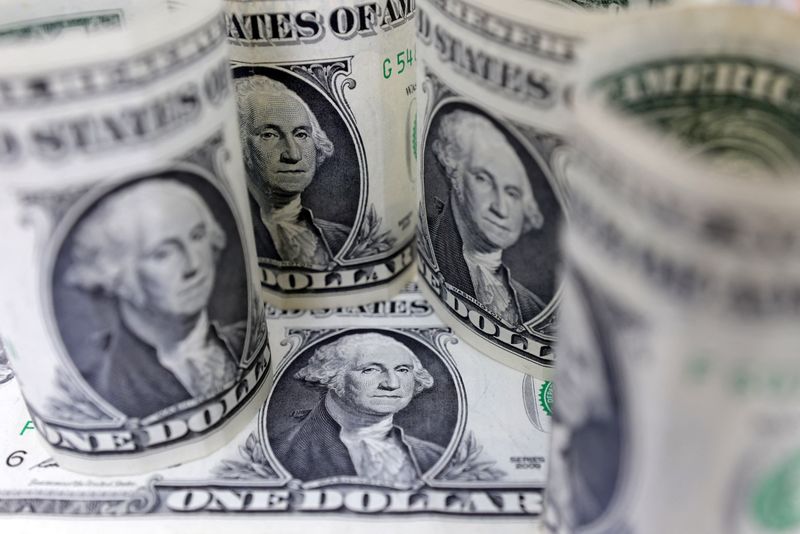By Kevin Buckland
TOKYO (Reuters) – The dollar softened on Tuesday as traders squared positions on the day of the U.S. presidential election, after recent polls dented some market bets on a victory for Republican Donald Trump.
Democrat Kamala Harris has also experienced improving odds on election gambling sites and had a slight lead on PredictIt overnight, although Polymarket continued to show Trump as favourite.
In recent weeks, financial markets and some betting platforms had leaned strongly in favour of a win for Trump, whose tariff and immigration policies are considered inflationary by analysts, leading to a rise in U.S. Treasury yields and gains for the dollar.
Overnight, though, the U.S. currency slumped as much as 0.76% against the euro to a three-week trough after a weekend opinion poll showed Harris with a surprise lead in Iowa, a traditional Republican stronghold. Overall, polls continue to show a tight race.
The dollar index, which measures the currency against six major peers including the euro, edged down slightly to 103.89 as of 0618 GMT, after slumping as low as 103.67 on Monday for the first time since Oct. 21. Last week it surged to the highest since the end of July at 104.63.
The euro edged up to $1.0879, after lifting to $1.09145 in the previous session for the first time since Oct. 15.
Sterling was slightly higher at $1.2959.
Against the yen, the dollar traded at 152.34, after slipping to 151.54 overnight, a one-week low.
“We judge financial markets are now positioned for a Harris win,” said Carol Kong, a currency strategist at Commonwealth Bank of Australia (OTC:CMWAY).
“The USD can therefore fall modestly by 1%‑2% this week if Vice President Harris wins and lift materially if (former) President Trump wins,” she said. “Any delays and/or disputes over vote counting can also add to currency volatility this week.”
The winner may not be known for days after Tuesday’s vote, though Trump has already signalled that he will attempt to fight any defeat, as he did in 2020.
Overnight implied volatility options for euro/dollar spiked to the highest since November 2016 on Tuesday, as did those for the dollar-Mexican peso pair. Mexico stands to be among the hardest hit by any protectionist Trump policies.
Bitcoin added 2.2% to about $68,542, after dipping to a one-week low of $66,776.19 overnight. Trump is viewed by analysts as enacting more favourable policies for cryptocurrencies than Harris.
“While your guess is as good as ours about who will win, we’re confident about the scenarios (we) laid out recently: In short, a Trump win or Red wave are bullish for the USD; a Blue Wave will crater the USD,” analysts at TD Securities said in a note. “Somewhere in the middle lies a Harris victory.”
“We don’t think Harris is necessarily bad for the USD over the medium term,” they said. “Harris simply shifts the focus back to macro, while Trump reshapes the market narrative around politics.”
On Thursday, the Federal Reserve is expected to cut rates by 25 basis points. Markets will focus on any clues that the U.S. central bank could skip a cut in December, after last week’s monthly jobs report showed employers added far fewer jobs than economists had expected in October, raising questions over the degree of softness in the labour market.
Also on Thursday, the Bank of England is expected to cut rates by 25 basis points, while the Riksbank is seen easing by 50 basis points, and the Norges Bank is set to stay on hold.
The Reserve Bank of Australia held policy steady on Tuesday, as widely expected, and retained wording in its statement that “policy will need to be sufficiently restrictive until the Board is confident that inflation is moving sustainably towards the target range.”
RBA Governor Michele Bullock leaned slightly hawkish in her news conference, saying she still believed there are upside risks for inflation.
Traders have not fully priced in a quarter-point rate cut until the May meeting.
The Australian dollar added 0.21% to $0.6600, finding its feet after slumping to the weakest level since Aug. 8 last week at $0.6537.
“Our central case is that the RBA’s first cut will not arrive until Q2 2025, but we see an increasing risk that it takes even longer for cuts to be delivered, or that the RBA misses the easing phase altogether,” HSBC’s chief economist for Australia and New Zealand, Paul Bloxham, wrote in a note.
“This could come about because domestic inflation continues to fall only very slowly or because, by the time domestic inflation has eased sufficiently, the global economy is already re-inflating,” he said.
“We ascribe a 25% chance to the possibility that the RBA does not cut its cash rate at all in 2025.”

